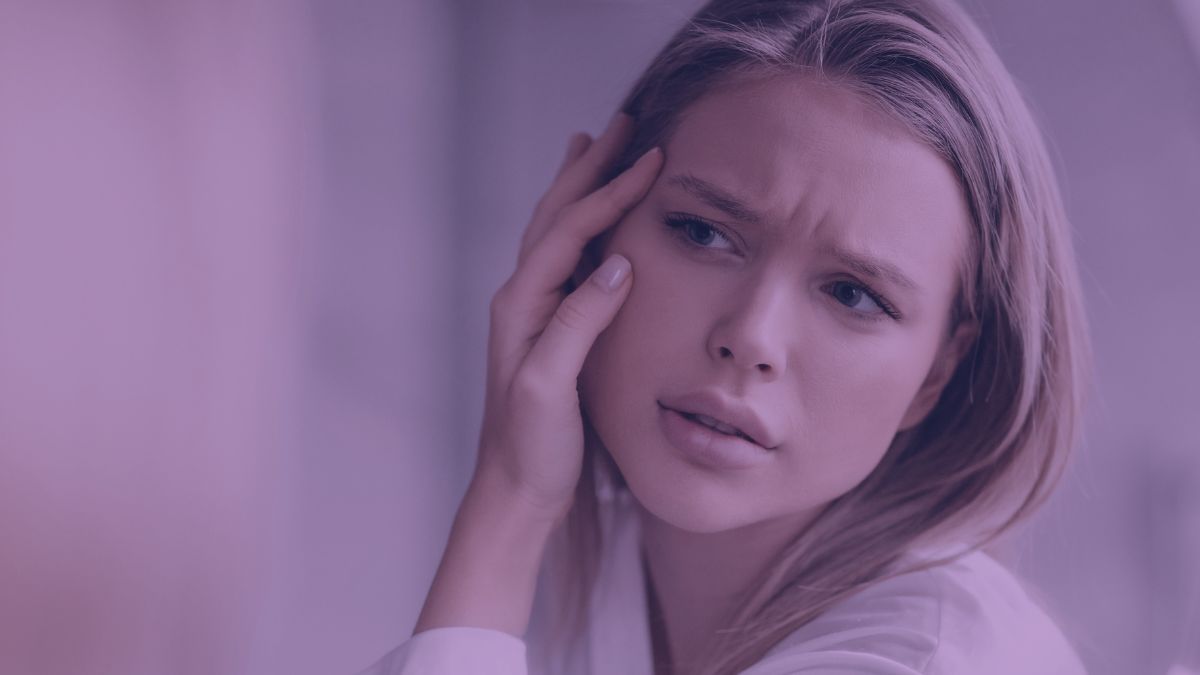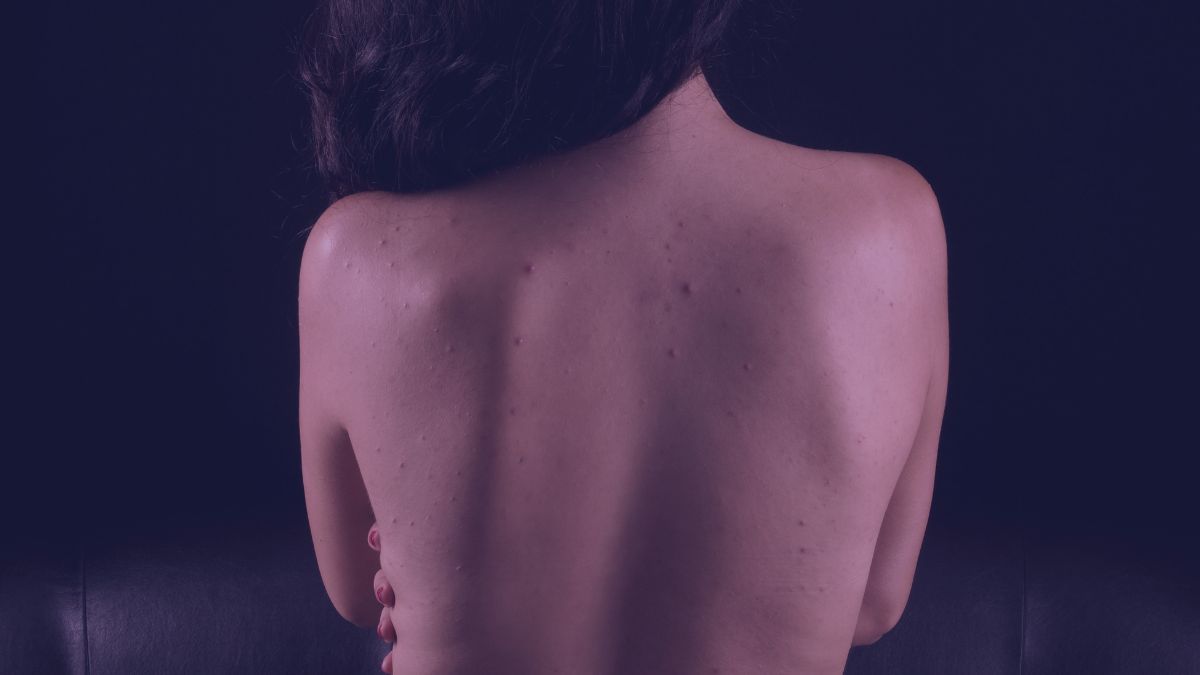Acne isn’t just a facial issue; it’s a skin condition that can affect any part of the body.
One particularly troublesome area is the back, where acne can be both persistent and challenging to treat.
In this article, I will explore whether Accutane can help get rid of back acne, what its potential side effects are, and if there are any alternatives to consider.

What Causes Back Acne and Why Is It Hard to Treat?
Back acne (backne), like facial acne, occurs when pores become clogged with oil and dead skin cells.
However, the skin on your back is much thicker and has more sebaceous glands (which produce oil), making it a hotspot for more severe forms of acne, such as cystic acne.
Factors like hormonal fluctuations, genetics, stress, and lifestyle habits can also exacerbate this condition.
Treating back acne can be even more challenging than tackling facial acne due to the difficulty of reaching, properly cleansing, and applying adequate treatment to the area.
Additionally, back acne can be more resistant to topical treatments as the skin on the back is thicker and less absorbent than the skin on the face.
Back acne can also require more potent treatments to penetrate and clear acne effectively, which can also increase the risk of skin irritation.
What Is Accutane and How Does It Work?
Accutane, the brand name for isotretinoin, is a medication primarily used to treat severe acne.
Originally developed as a chemotherapy drug due to its ability to rapidly divide cells, Accutane found its place in acne treatment because of its effects on the skin’s oil glands.
Accutane reduces the size and output of the skin’s sebaceous glands and decreases oil production, which prevents the clogging of pores, thus reducing the formation of acne.
Additionally, Accutane helps renew skin cells more rapidly, which helps clear up the skin and leftover acne scars by refining tone and texture.
While it’s a highly effective treatment, Accutane is typically reserved for severe or persistent acne cases that don’t respond to other treatments due to its intense nature and potential side effects, which we will cover later.
Can Accutane Help Get Rid of Back Acne?
Accutane can be highly effective in treating back acne due to reducing oil production, promoting skin cell renewal, and clearing clogged pores.
Dermatologists often turn to Accutane when other treatments have not yielded satisfactory results, particularly for nodular or cystic acne on the back that can often be disfiguring and leave lasting scars.
Patients who undergo Accutane treatment generally observe a significant reduction in back acne, with some experiencing long-term remission.
However, Accutane is not a universal solution for everyone.
Its use is typically based on individual factors such as the severity of acne, medical history, body weight, personal lifestyle, and the ability to manage potential side effects.
Additionally, while effective, Accutane isn’t a permanent solution for back acne, and many users have had to go through multiple rounds in the span of several years to maintain clear skin.
Therefore, if Accutane removes your back acne, continuing with proper skincare and long-term maintenance treatments is essential to prevent future breakouts.
The Side Effects of Accutane

While Accutane can effectively treat back acne, it’s important to be aware of its potential side effects.
These can range from mild to severe, and not everyone experiences them to the same degree.
Here are some common side effects:
Dry Skin and Lips: Accutane significantly reduces oil production, which can lead to dryness, particularly on the lips and skin.
Sensitivity to Sunlight: Lack of oil production also reduces the skin’s natural protection against UV rays, making it more sensitive to sunlight.
Nosebleeds: Accutane can cause drying and cracking of the inside lining of the nose, which can lead to nosebleeds.
Mild Aches and Pains: Some users report joint and muscle pain during treatment.
In rare cases, Accutane can cause more serious side effects, such as:
Mental Health Effects: Reports of depression, anxiety, and mood changes have been associated with Accutane use.
Gastrointestinal Issues: Issues such as bowel inflammation can occur, though rarely.
Elevated Cholesterol Levels: Regular blood tests are often required to monitor cholesterol and triglyceride levels during treatment.
Other Solutions for Back Acne

While Accutane is an effective option for severe back acne, not everyone will be a suitable candidate or may not want to take such an intense medication.
Therefore, here are a few other solutions for back acne, including topical and lifestyle changes, that will help not only achieve clear skin but also prevent future breakouts:
Topical Treatments
Salicylic Acid: An oil-soluble acid, salicylic acid helps unclog pores and reduce inflammation, making it a popular ingredient in many acne-fighting products. The best way to use it on the back is in a spray bottle or a cleanser form.
Mandelic Acid: Another type of alpha-hydroxy acid, mandelic acid, helps exfoliate dead skin cells and reduce bacteria on the skin’s surface. The best way to use it on the back is in a spray bottle or a cleanser.
Benzoyl Peroxide: An antibacterial agent, benzoyl peroxide kills acne-causing bacteria and is available in various over-the-counter topical treatments. It can be used in a cleanser or a leave-on ointment form for best results.
Retinoids: Topical retinoids help increase cellular turnover and effectively preventing clogged pores. They are available in various formulations, including body lotions in larger sizes for use on the back.
Dietary Changes
Reduce High Glycemic Foods: Foods that cause a rapid increase in blood sugar can contribute to acne by exacerbating inflammation.
Hydration: Drinking enough water is essential for skin health, as it helps flush out toxins from the body by improving the function of the lymphatic system responsible for detoxifying the skin.
Nutrient-Rich Diet: Consuming foods rich in antioxidants, like fruits and vegetables, can help reduce inflammation and promote clear skin.
Lifestyle Habits
Regular Washing of Clothes and Bed Linens: Keeping your clothes, especially workout attire and bed linens, clean can reduce the buildup of oils and skin cells that contribute to back acne by clogging the pores.
Haircare: For those with long hair, ensure regular washing and be cautious of using conditioners and leave-on hair products, as they can build up and contribute to clogging pores on the back.
Shower After Sweating: A prompt shower after exercise or excessive sweating can help prevent pore-clogging on the back.
Avoid Tight Clothing: Tight clothing can trap sweat and oil against the skin, worsening acne. Opt for loose, breathable fabrics.
Avoid Softeners: Fabric softeners leave waxy residue on clothes that can clog pores. Instead, opt for fragrance-free detergent or wash non-delicates in white vinegar and a few drops of essential oil to avoid buildup.
Frequently Asked Questions
Is Accutane Safe for Long-Term Use?
Accutane is generally prescribed for a limited period, often between 4 to 6 months, due to its strong nature and potential side effects.
Long-term use is not commonly recommended, and continuous monitoring by a healthcare professional is crucial during the treatment period.
Can Lifestyle Changes Impact Back Acne?
Lifestyle changes, particularly in diet, hygiene, and clothing choices, can significantly impact the severity and frequency of back acne.
Incorporating a diet low in high glycemic foods, maintaining good hygiene, especially after sweating, and wearing loose-fitting clothing made of natural materials can all contribute to better skin health.
Are There Any Immediate Remedies for Sudden Back Acne Flare-Ups?
Over-the-counter topical treatments containing salicylic acid or benzoyl peroxide can effectively relieve acne.
Additionally, adding a retinoid-based body lotion to your body care routine further helps reduce flare-ups by speeding up cellular turnover and preventing clogged pores.
Finally, you can also invest in professional chemical peels a few times a year to help maintain clear skin.

My name is Simone and I am a certified skin specialist. I created this website to teach my readers how to take great care of their skin and I also like to occasionally share my honest opinions on skincare products I’ve tried. You can learn more about me here.
